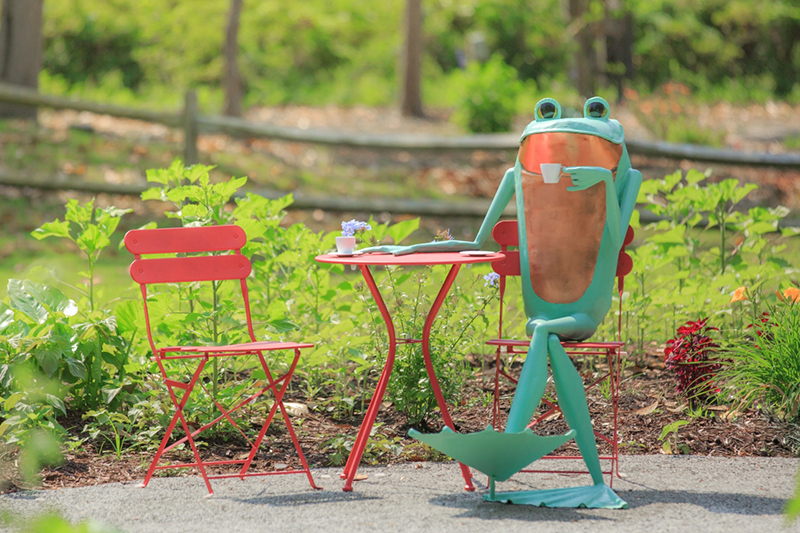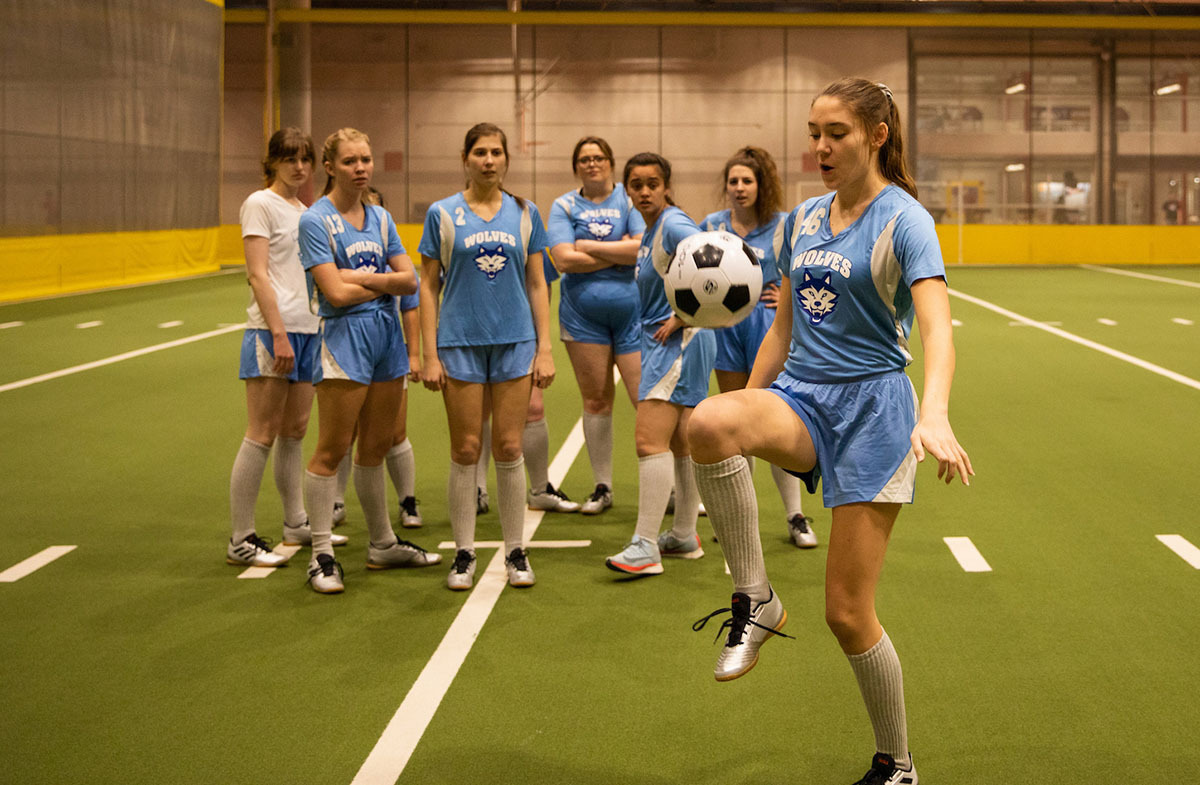Inspiring floor

Photo by Christopher Gannon.
A tile mosaic, "Gene Pool," by Andrew Leicester seemingly undulates beneath students studying, unaware, in the Molecular Biology Building atrium Monday morning.
Chatbot technology will help answer common questions

Have a question? Just ask Cy. Iowa State's mascot is the face of a "chatbot" virtual assistant deployed this month on several student-focused websites to help users find answers to common questions.
The chatbot project is funded in part by the University Innovation Alliance (UIA), a collaboration of public research universities working to help more students graduate. Darcie Sprouse, Iowa State's UIA fellow, is managing the project.
"The funding for this project came from our membership in the University Innovation Alliance which gives us an opportunity to focus our efforts on increasing retention and graduation of first-generation and low-income students," Sprouse said.
Interactive technology
Current and prospective students (and their families) are the target chatbot audiences. The interactive chat feature debuted on the registrar, financial aid and accounts receivable websites and is being added to the admissions, residence and Veterans Center sites. The chatbot can converse in English and Spanish, with more languages -- Mandarin Chinese, for example -- on the way, Sprouse said.
"The chatbot allows students and families to ask questions 24/7 about financial aid, admissions, housing and student accounts," Sprouse said. "The goal of the chatbot project is to better meet students where they are and provide quicker and easier access to information."
Other UIA initiatives
A pop-up window with a smiling mugshot of Cy and a "May I help you?" invitation appears in the lower right corner of the participating websites. The machine learning software interacts conversationally to address routine inquiries, including answers customized for Iowa State. The chatbot vendor, Ocelot, also provides a video library resource with short tutorials to help with financial aid inquiries.
Participating offices receive transcripts of the anonymous sessions to monitor the volume and subject matter of the inquiries. If the chatbot can't answer a question, users have the option to provide contact information for the appropriate office to follow up during regular business hours.
"What we've noticed so far is that the 'I don't know' questions are usually related to offices or topics outside the participating departments," Sprouse said.
Virtual answer center
The online chatbot replaces the Student Answer Center, which was located in the ground-floor atrium of Beardshear Hall. The student financial aid office closed the physical location in December.
"The Student Answer Center was underutilized, and in the 20 years since it was installed, technologies have changed significantly such that students are rarely seeking answers in person to generalized questions," said Roberta Johnson, director of student financial aid.
New LEGO exhibit comes to Reiman this spring

“Ribbit the Exhibit,” an exhibit featuring 10 scenes of human-sized frogs reflecting human personalities and interests, will open at Reiman Gardens on July 8. Photos courtesy of Reiman Gardens.
Reiman Gardens will feature two main exhibits this year, both representing its 2020 theme “Wild and Whimsical.”

A family of polar bears is part of the final "Nature Connects" exhibit.
The first exhibit is the newest and final installment in “Nature Connects: Art with LEGO Blocks,” which depicts the natural world in sculptures -- often larger-than-life -- constructed entirely from LEGO bricks. The exhibit includes 12 portrayals of threatened, endangered and extinct animals from around the planet, from a monarch butterfly on a milkweed plant to a family of polar bears. The sculptures will be on display in the outodoor gardens May 16-July 5.
The Nature Connects series, created by New York artist Sean Kenney, was developed and is owned by Reiman Gardens, which leases the exhibits to public gardens and zoos across North America. Reiman Gardens hosted other Nature Connects exhibits in 2012 and 2016.
A second exhibit opening July 8, “Ribbit the Exhibit,” will feature 10 scenes of human-sized frogs reflecting human personalities and interests, including biking, meditating and striking the pose from the classic Grant Wood painting “American Gothic.” North Carolina artist J.A. Cobb created the copper sculptures, which will be exhibited in the gardens until Oct.4.
The “Magical Fairy Woodland” display that opened in Hughes Conservatory in January also is based on the Wild and Whimsical theme. Tiny plants in pastel hues create a fairy-friendly atmosphere wee folk of all kinds will enjoy. The fairy woodland display is open through March 14.
In the Garden Room Gallery, “The Great Outdoors,” a collection of photos from the Des Moines Camera Club, is on display through late March. April through June, the gallery will feature “Whispers of Autumn,” paintings by Iowa artist Autumn Rozario Hall that combine acrylic and mixed media with pieces of trash and natural objects found on hikes throughout Iowa’s parks.
Reiman Gardens is open daily 9 a.m.-4:30 p.m. Admission is $9 for adults, $8 for ages 65 and older, $4.50 for ages 2-12, and free for members, active-duty military and ISU students.
Departments can benefit from having a diversity plan
Michael Bugeja has been trying to get the conversation started since 2004. That is when the former director of the Greenlee School of Journalism and Communication began working with a committee to come up with a diversity plan that would satisfy accreditation standards for the school. The same year he chaired the first diversity committee in the College of Liberal Arts and Sciences.
He has heard the argument that diversity cannot be forced on anyone, but his reply is simple and direct.
"I am not forcing anything on anyone," said Bugeja, a Distinguished Professor. "I am asking the faculty and staff to have a discussion about whether they want to adopt a plan. Everyone has an obligation to at least discuss it and embrace the consequences of what you decide to do."
Bugeja saw the work done on diversity at the Greenlee School earn the Association for Education in Journalism and Mass Communication's 2014 Equity and Diversity Award.
What is it?
Diversity plans serve multiple purposes for a department and hold department members accountable to its details.
Read more
Michael Bugeja wrote "Creating and publicizing a diversity plan" for Inside Higher Education.
"It is a bottom-up document that talks about the importance of diversity, defines what diversity is for that department and describes procedures for assessment of progress or setback."
Diversity plans can be tailored to a department's needs, but there is a three-part structure they follow:
- Preamble
- Goals
- Assessment
The preamble focuses on why diversity is important and aligns with the university strategic plan. An action plan sets long-term goals -- for example, encourage diverse applicant pools or diversifying the curriculum. Finally, determine how to measure results.
When formulating a diversity plan, Bugeja suggests students and alumni be included to draft the most complete document. Talking to and learning from departments that have strong diversity plans can help others shape their plan.
Once a plan is approved by the faculty and staff and put in place, it acts as a guide when disagreements occur and as a cause of celebration when progress is made.
"Unlike a strategic plan, which is typically a five-year plan, a diversity plan is assessed every year," Bugeja said. "The report is given to the faculty and put online."
Importance
Bugeja believes every department should have three documents:
- Mission statement
- Strategic plan
- Diversity plan
"A mission statement defines what the curriculum is for a department, but also it should have a statement on diversity," he said. "In every single department there is some element of diversity. It's not only related to ethnicity. Every department also needs a strategic plan, and if not, it is not fully participating in shared governance."
By the end of this semester, every department will have instructors complete inclusive classroom training to addresses racism and discrimination on campus in response to concerns from Students Against Racism. Bugeja believes diversity plans can add another important layer.
"President (Wendy) Wintersteen is committed to an inclusive environment," he said. "But there is a lack of assessment, and if diversity plans are adopted collegewide, we won't need regular inclusive training. The department will take that over."
Everyone impacted
Every department should have a discussion on diversity, inclusion and equity, even if the need may not be evident. Issues that arise will be more time consuming and disruptive for faculty without a diversity plan, Bugeja said.
The mathematics department has been addressing diversity for years.
"For us it is not curricular. It is about diversifying and supporting a diverse population of graduate students, postdocs and faculty," said Leslie Hogben, professor of mathematics and Dio Lewis Holl Chair in Applied Mathematics, who also served as the department's director of diversity for 10 years (2009-2019).
Hogben said the math department has built relationships with minority-serving colleges to bring a more diverse group to campus and try to retain some as faculty. Mathematicians of Color Alliance, a group of minority graduate and undergraduate math students, focuses on recruitment and retention of underrepresented students.
"We value diversity of all kinds," Hogben said.
'Wolves' shares the fighting spirit of a teen girls' soccer team

"The Wolves" cast members had to learn soccer skills and team dynamics in addition to the script. Photo by Britney Walters-Chester.
What happens inside the warm-up circle of a competitive high school girls soccer team? ISU Theatre's "The Wolves" invites audiences to eavesdrop on teenage conversations both profound and hilarious as a soccer team navigates big questions and wages tiny battles during six weeks of practice.
A 2017 Pulitzer Prize finalist in drama penned by Sarah DeLappe, "The Wolves" opens its two-weekend run Feb. 28 as part of ISU Theatre's 2019-20 "HERoic" season of shows written by women. The production's all-female ensemble portrays nine players, known by jersey numbers rather than names, and one "soccer mom."
"A lot of the shows we create at Iowa State have an ensemble cast, but it's rare for it to be written into the script," said Taylor Millar, a 2017 performing arts alumna and the show's guest director. "Every character is onstage for almost the entire show. Not very often do we see a team portrayed on stage, other than when we create it."
On a surrealist soccer field, created by scenic designer and ISU alumna Eleanor Kahn, the team faces the awkward transition from adolescence to maturity.
"When I read the script for the first time, it was a lot of nostalgia about being naïve and the experience of growing up," said senior Jillian Kurovski, who plays the role of No. 14. "It brought me back to memories of the struggles of being a teenage girl."
Panel discussion
ISU Theatre will present a panel discussion, "Diversifying the Wolfpack: Championing Gender Equity in the Arts and Athletics," on Sunday, March 1 (3 p.m., 004 Scheman). Community members are invited to enjoy refreshments and a roundtable discussion with local, regional and national artists and scholars as part of ISU Theatre's yearlong symposium series, "HERoic: Gender Equity in the Arts."
Tackling tough timing
To mimic teenage conversations, the show employs rapid-fire, overlapping dialogue with conversations that ricochet from tampons to the Khmer Rouge.
"Knowing when to say the line at the right moment and getting into the rhythm of saying the lines has been a challenge," said sophomore Opal Rustad, who plays the bubbly, conflict-averse No. 8.
"Every time you see it, you'll want to listen to a different conversation," Millar said. "Come for the dialogue. Come for the discoveries you'll make."
The teenage drama is both intense -- the show contains an advisory for adult language and mature content -- and endearingly comedic.
"I don't think people typically think high school girls are very funny, but they say so many things that are hysterical and deep," Millar said. "They talk about real-life issues, and they're not uninformed."
Soccer drills on stage
Portraying a soccer team on stage required the cast to learn basic soccer fundamentals, as well as build their physical stamina. Millar brought in a friend to teach both soccer drills and team dynamics.
Sophomore Abi Fisher plays the team captain. She said the cast's journey to learn soccer together has been an "adventure."
"A lot of us have never played soccer before," she said. "We learned some passing drills and started feeling more and more comfortable with the soccer ball. We had a rule that for every runaway ball during our warm-ups and run-throughs, we had to run one lap around the theater. It got our focus on point!"
Life lessons
Senior Ellie Seaton, who plays No. 7, a drama-causing bully, said she hopes audiences learn: It is OK to cringe at their past selves.
"Nobody grows up having done absolutely nothing that they will regret later," she said. "Life is really about how you change and grow. No. 7 starts the show not knowing how to play well with the others. By the end, she has been put in situations that make her more mature."
Theater and athletics both offer lifelong lessons, Millar said.
"Theater makes you better at a million different things," she said. "Whatever you do, it's always a really important part of your life's journey. This isn't to get better at theater. It's to get better at life."
Show information
"The Wolves" evening performances are Feb. 28, 29 and March 5-7 at 7:30 p.m. A matinee will begin March 1 at 1 p.m. All performances are in Fisher Theater.
Tickets ($20 for adults, $18 for seniors and $10 for students) are available through the Stephens Auditorium ticket office, Ticketmaster or the Fisher Theater box office prior to performances.
